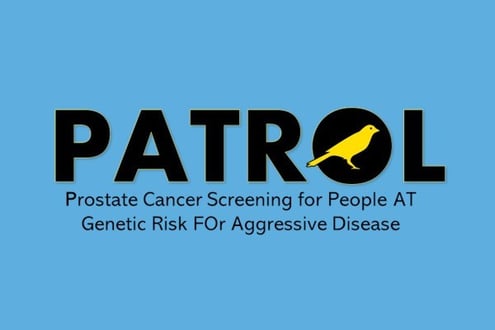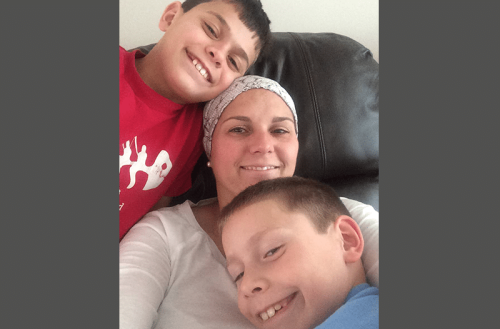PALB2: Risk Management
Risk Management for People with Inherited Mutations
People with mutations have options for managing their increased cancer risk. Experts at the National Comprehensive Cancer Network (NCCN) created guidelines for people with a mutation to manage their cancer risk. We recommend that you speak with a genetics expert who can look at your personal and family history of cancer and can help you decide on a plan for managing your risk.
NCCN recommends that all people with an inherited mutation receive education on the signs and symptoms of PALB2-related cancers. NCCN guidelines for specific cancers are listed below.
People with a mutation may also qualify for clinical trials looking for more effective screening, prevention or interception of cancer.
|
Beginning Age |
Recommendation |
Additional Information |
|
25 |
Learn to be aware of changes in your breasts. |
Self exams may be most informative at the end of the menstrual cycle. |
|
25 (or earlier based on youngest age of breast cancer in the family) |
Breast exam by doctor (also known as a clinical breast exam) every 6-12 months. |
The guidelines recommend that people who have risk-reducing mastectomy continue to receive clinical breast exams. |
|
30 (or earlier based on youngest age of breast cancer in the family) |
Discuss the benefits, risks and costs of yearly breast with and without contrast with your doctor. |
|
|
30 (or earlier based on youngest age of breast cancer in the family) |
Yearly . |
|
|
No set age |
Discuss the benefits, risks and costs of risk-reducing mastectomy. |
Risk-reducing mastectomy lowers breast cancer risk by 90%, but has not been shown to improve survival. Even after double mastectomy, some breast tissue, and therefore cancer risk remains. Clinical breast exam should be continued after risk-reducing mastectomy. |
|
No set age |
Discuss the benefits, risks and costs of medications to lower the risk for breast cancer with your doctor. |
Tamoxifen or other estrogen-blocking drugs may lower breast cancer risk. Medications or vaccines are being studied in clinical trials. |
|
75 |
Have a discussion with your doctor about whether to continue, stop or change breast screening. |
|
|
Source: NCCN Guidelines: Genetic/Familial High-Risk Assessment: Breast, Ovarian, Pancreatic, , v. 3, 2026. |
||
|
Beginning Age |
Recommendation |
|
35 |
Learn how to do a breast self-exam and be aware of changes in your breasts. |
|
35 |
Breast exam by doctor every 12 months. |
|
50 (or earlier based on the youngest case of male breast cancer in the family) |
Have a discussion with your doctor about the benefits, risks and costs of annual . |
|
Source: NCCN Guidelines: Genetic/Familial High-Risk Assessment: Breast, Ovarian, Pancreatic, , v. 3, 2026. |
|
|
Beginning Age |
Recommendation |
Additional Information |
|
45 - 50 |
Have a discussion with your doctor about the benefits, risks and costs of risk-reducing removal of the ovaries and (risk-reducing salpingo-oophorectomy). |
|
|
Before age 50 |
Have a discussion with your doctor about the risks, benefits and costs of removing your uterus (hysterectomy) at the time of . |
The following factors may affect your decision about hysterectomy at the time of RRSO:
|
|
Before age 50 |
Experts believe that most ovarian cancers begin in the . Researchers are studying whether the removal of the only (), while delaying until closer to the age of natural menopause is a safe option for lowering risk in people who are not ready to remove their ovaries. Guidelines recommend that people interested in this approach speak with their doctor about the benefits and risks, and consider enrolling in a research study. |
|
|
No set age |
Speak with your doctor about the benefits, risks and timing of oral contraceptives or intrauterine devices (IUD) to lower the risk for ovarian and cancers. |
|
|
No set age |
Become aware of ovarian and primary peritoneal cancer symptoms. Report any symptoms that persist for several weeks and are a change from normal to your doctor. Routine ovarian cancer screening using transvaginal and a blood test has not shown benefit and is not recommended. |
Symptoms of ovarian cancer include:
|
|
Source: NCCN Guidelines: Genetic/Familial High-Risk Assessment: Breast, Ovarian, Pancreatic, , v. 3, 2026. |
||
Types of pancreatic cancer screening tests
There are two tests that are used to look for pancreatic cancer in high-risk people.
- MRCP (Contrast-enhanced magnetic resonance cholangiopancreatography) is a special type of imaging that looks closely at the pancreas, liver, gallbladder, bile duct and pancreatic duct to find abnormalities such as cancer.
- EUS (Endoscopic ) involves passing a tiny scope with an attached probe down the esophagus to the stomach. This allows doctors to look closely at the pancreas.
Researchers are testing new approaches to pancreatic cancer screening and prevention through clinical trials.
Pancreatic cancer guidelines
|
Beginning Age |
Family History |
Recommendation |
|
50 (or earlier based on the youngest case of pancreatic cancer in the family) |
For mutation carriers with a first- or second- degree relative with pancreatic cancer |
|
|
Source: NCCN Guidelines: Genetic/Familial High-Risk Assessment: Breast, Ovarian, Pancreatic, , v. 3, 2026. |
||
cancer guidelines
Research suggests that mutations may also increase the risk for cancer. More research is needed to better define this risk. In the meantime, experts recommend that men with mutations have a conversation with their doctor about cancer screening.
|
Beginning Age |
Recommendation |
|
40 |
|
|
Source: NCCN Guidelines: Genetic/Familial High-Risk Assessment: Breast, Ovarian, Pancreatic, , vs. 3, 2026. |
|
Other cancers
There isn’t enough research to show that people with a mutation benefit from extra screening or prevention for other types of cancer. Because of this, experts recommend following general population screening guidelines and considering your family history when managing these risks. National guidelines exist for screening the following cancers:
More Resources
Participate in Prevention Research
The screening and prevention studies below are enrolling people with mutations. To search for more studies, visit our Search and Enroll Tool.
Screening Study for Pancreatic Cancer in People with Inherited Mutations
Clinicaltrials.gov identifier: NCT05058846
PATROL Study: Prostate Cancer Screening for People AT Genetic Risk FOr Aggressive Disease
Clinicaltrials.gov identifier: NCT04472338
Screening Study for Men at High Genetic Risk for Prostate Cancer
Clinicaltrials.gov identifier: NCT03805919
Stories from the Community
August 24, 2020
Watch Our Expert Webinars on Mutations
Spotlight on Hereditary Cancer Research
Cancer Risks, Screening and Prevention for People with ATM, CHEK2, PALB2 and Other Genes





